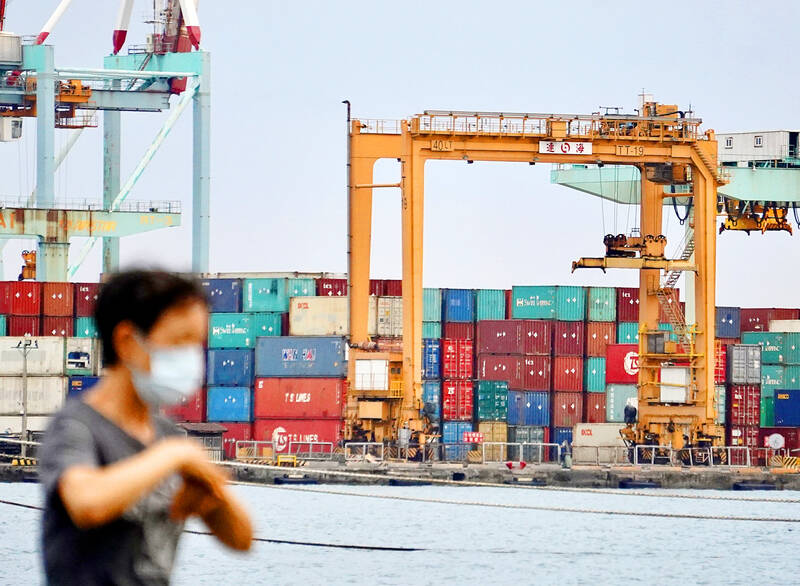The Directorate-General of Budget, Accounting and Statistics (DGBAS) yesterday raised its forecast for Taiwan’s GDP growth this year to 4.27 percent, from the 3.90 percent it predicted in August, as exports and private investment proved stronger on the back of the artificial intelligence (AI) boom.
The upward revision came after the nation’s export-oriented economy last quarter increased 4.17 percent, 0.2 percentage points higher than data last month showed.
“Taiwan’s current economic state remains healthy and would advance at a pace faster than the global average,” DGBAS deputy head Tsai Hung-kun (蔡鴻坤) told a news conference after a quarterly review.

Photo: CNA
The uptrend would sustain this quarter and next year with a large chance for Taiwan to outperform regional trade rivals South Korea, Hong Kong and Singapore, he said.
The statistics agency is expecting GDP growth of 3.29 percent for next year, an uptick of 0.03 percentage points from three months earlier.
Outbound shipments, which drive more than 60 percent of GDP, increased 8.03 percent during the July-to-September period, considerably faster than the earlier projection of 6.27 percent, DGBAS said.
The showing had to do with aggressive spending on the part of US technology giants to develop AI capacity and applications. Taiwan is home to the world’s top suppliers of AI chips, servers, storage and memory devices used in cloud-based data centers and other AI applications.
Exports might expand 9.72 percent this year, from 8.71 percent previously, in line with rosier earnings guidance by major local tech firms.
However, Taiwan’s economic recovery is imbalanced, Tsai said.
Non-tech manufacturers of chemical, plastic, metal and petrochemical products remain weighed by a slowdown in China and elsewhere as well as by a capacity glut and sharp price competitions, he said.
Firms on the AI supply chain would continue to outperform next year, Tsai said, as US firms have indicated plans to step up AI expenditures.
Business in non-tech manufacturing sectors could improve next year, helped by low bases this year, statistics department chief Tsai Yu-tai (蔡鈺泰) said.
Private investment, another growth catalyst, staged an 8.42 percent increase, as local firms upgrade technology and expand capacity to meet demand from customers, the DGBAS said.
The GDP component is projected to gain further momentum this quarter and stay in expansion mode next year, it said.
Private consumption held resilient, supported by wage hikes and wealth inflation linked to TAIEX rallies, though many Taiwanese prefer to travel abroad, it said.
Revenue at restaurants last quarter rose 0.75 percent, while hotels posted a decline of 1.52 percent in sales, it said.
Financial institutes reported a 7.31 percent hike in interest income and a 21.24 percent jump in fee income.
The consumer price index might grow 2.18 percent this year and moderate to 1.93 percent next year, the DGBAS said, calling attention to lingering geopolitical tensions and unfavorable trade terms ahead.
DGBAS Minister Chen Shu-tzu (陳淑姿) told lawmakers on Thursday that additional tariffs imposed by Washington against Taiwan’s exports, if they materialize, would affect Taiwan’s GDP growth in 2026.
The agency would supply more details regarding different scenarios after the US sheds more reliable light on the matter, the minister said.

In Italy’s storied gold-making hubs, jewelers are reworking their designs to trim gold content as they race to blunt the effect of record prices and appeal to shoppers watching their budgets. Gold prices hit a record high on Thursday, surging near US$5,600 an ounce, more than double a year ago as geopolitical concerns and jitters over trade pushed investors toward the safe-haven asset. The rally is putting undue pressure on small artisans as they face mounting demands from customers, including international brands, to produce cheaper items, from signature pieces to wedding rings, according to interviews with four independent jewelers in Italy’s main

Japanese Prime Minister Sanae Takaichi has talked up the benefits of a weaker yen in a campaign speech, adopting a tone at odds with her finance ministry, which has refused to rule out any options to counter excessive foreign exchange volatility. Takaichi later softened her stance, saying she did not have a preference for the yen’s direction. “People say the weak yen is bad right now, but for export industries, it’s a major opportunity,” Takaichi said on Saturday at a rally for Liberal Democratic Party candidate Daishiro Yamagiwa in Kanagawa Prefecture ahead of a snap election on Sunday. “Whether it’s selling food or

CONCERNS: Tech companies investing in AI businesses that purchase their products have raised questions among investors that they are artificially propping up demand Nvidia Corp chief executive officer Jensen Huang (黃仁勳) on Saturday said that the company would be participating in OpenAI’s latest funding round, describing it as potentially “the largest investment we’ve ever made.” “We will invest a great deal of money,” Huang told reporters while visiting Taipei. “I believe in OpenAI. The work that they do is incredible. They’re one of the most consequential companies of our time.” Huang did not say exactly how much Nvidia might contribute, but described the investment as “huge.” “Let Sam announce how much he’s going to raise — it’s for him to decide,” Huang said, referring to OpenAI

Nvidia Corp’s negotiations to invest as much as US$100 billion in OpenAI have broken down, the Wall Street Journal (WSJ) reported, exposing a potential rift between two of the most powerful companies in the artificial intelligence (AI) industry. The discussions stalled after some inside Nvidia expressed concerns about the transaction, the WSJ reported, citing unidentified people familiar with the deliberations. OpenAI makes the popular chatbot ChatGPT, while Nvidia dominates the market for AI processors that help develop such software. The companies announced the agreement in September last year, saying at the time that they had signed a letter of intent for a strategic